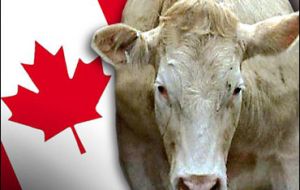MercoPress. South Atlantic News Agency
Canada mad cow case blamed on feed manufacturer

The Canada Food Inspection Agency says a British Columbia feed manufacturer is the most likely source of the country's 13th case of mad cow disease.
Canada brought in changes more than a decade ago to stop animal products from being fed to cattle, sheep and goats and prevent the transfer of bovine spongiform encephalopathy into the food chain. But Dr. Connie Argue of the Canadian Food Inspection Agency said this week that one of the most recent cases of BSE and all 12 previous cases likely came "through incidents of accidental cross-contamination, which may occur in the complex feed and manufacturing system." There have been 14 cases of BSE diagnosed in Canada since 2003, the most recent found in Alberta in August. When the first case was discovered the US, Japan, South Korea, Australia and several other countries imposed a temporary import ban on Canadian beef. The latest agency report involves a five-year-old dairy cow from British Columbia's Fraser Valley which tested positive for the disease in June. Because the incubation period is four to six years officials believe the animal was contaminated as a calf. The food source was narrowed down to an unnamed food supplier of heifer ration that also manufactured food for other, non-ruminant animals that contained material prohibited from cattle, sheep and goat feed. Two other unnamed feed manufacturers where prohibited material was handled were also mentioned in the report as potential areas for cross-contamination. The report said the feed did not contained banned protein on purpose, but may have been contaminated by equipment used to process non-ruminant feed. "Bulk ingredient receiving and finished feed conveyances were cross-utilized," the report said. The agency said a total of 207 other animals connected to the diseased cow either have been or will be destroyed. "The detection of this case does not change any of Canada's BSE risk parameters," the report concluded. "The location and age of the animal are consistent with previous cases." Canada is classified under the world organization for animal health as a controlled BSE risk country. Last year the Canadian government extended regulations to eliminate all risk materials, tissues that have been shown to harbour BSE infection, from all animal food, pet feed and fertilizer. "The enhancements to the feed ban are meant to accelerate BSE eradication in Canada," Argue said. She predicted there will be more animals diagnosed with BSE in the next few years but said the fact that infected animals continue to show up is a testament to how vigilant the inspection process is in Canada. (Canadian Press)




Top Comments
Disclaimer & comment rulesCommenting for this story is now closed.
If you have a Facebook account, become a fan and comment on our Facebook Page!